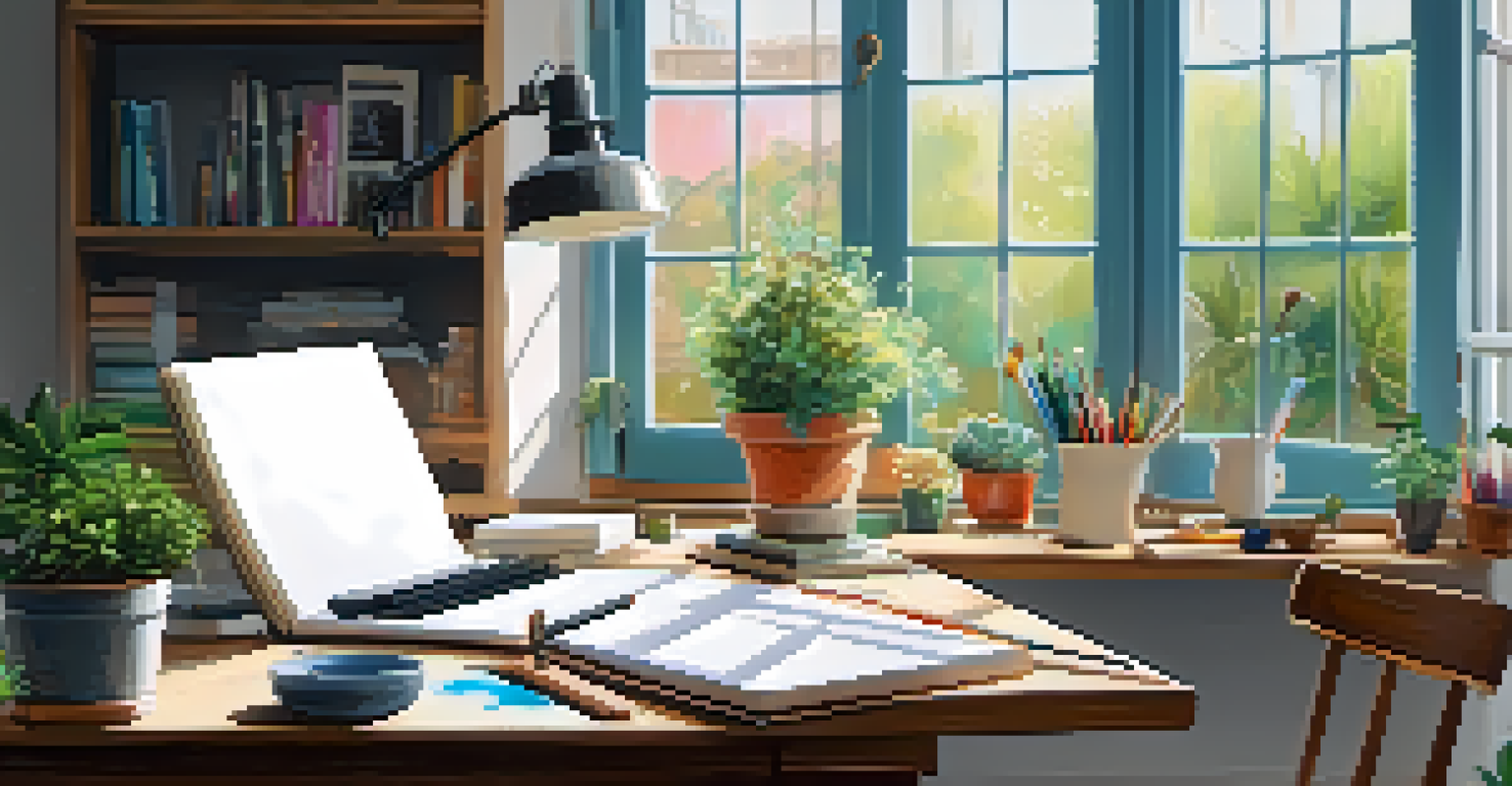Mindfulness and Creativity: Techniques for Stress Relief

Understanding Mindfulness and Its Benefits
Mindfulness is the practice of staying present and fully engaging with the moment. This simple yet powerful technique allows you to observe your thoughts and feelings without judgment. By focusing on the here and now, you can reduce stress and enhance your overall well-being, paving the way for greater creativity.
Mindfulness is a way of befriending ourselves and our experience.
When you cultivate mindfulness, you create mental space that fosters new ideas and perspectives. Imagine a cluttered desk; it’s hard to find the right tool when everything is jumbled together. Mindfulness declutters your mind, helping you think more clearly and creatively.
Research shows that regular mindfulness practice can lead to improved cognitive flexibility, which is crucial for creative problem-solving. When you’re less stressed, your brain has the freedom to explore unconventional solutions, making creativity a natural byproduct of mindfulness.
The Connection Between Mindfulness and Creativity
Mindfulness and creativity go hand in hand, much like a painter and their canvas. Practicing mindfulness allows you to tap into your inner resources, enabling you to express your creativity more freely. When you’re present, you can better access your emotions and experiences, which often serve as inspiration for creative projects.

Think of mindfulness as a bridge that connects your ideas and feelings. It helps you bridge the gap between your thoughts and the creative expressions that follow. When you nurture this connection, you’ll find that new ideas flow more effortlessly.
Mindfulness Enhances Creativity
Practicing mindfulness fosters a clear mind that allows for greater creative expression and problem-solving.
Moreover, mindfulness encourages a playful mindset, which is essential for creativity. By letting go of the fear of failure and embracing curiosity, you create an environment where innovation thrives. This playful approach can lead to unexpected and delightful creative breakthroughs.
Simple Mindfulness Techniques to Boost Creativity
One effective mindfulness technique is mindful breathing. Take a few moments to focus solely on your breath—inhale deeply, hold, and exhale slowly. This practice not only calms your mind but also helps you center your thoughts, allowing creativity to blossom.
Creativity is intelligence having fun.
Another technique is the body scan, where you mentally check in with different parts of your body. As you do this, notice any tension or discomfort. Acknowledging these sensations can help release stress and encourage a more relaxed state of mind, priming you for creative thinking.
Journaling is also a wonderful way to practice mindfulness while boosting creativity. Spend a few minutes each day writing down your thoughts, ideas, or even doodling. This technique can help clarify your thoughts and spark new ideas, making it a valuable tool in your creativity toolbox.
Creating a Mindful Environment for Creativity
Your environment plays a significant role in your ability to practice mindfulness and creativity. Start by creating a dedicated space for your creative endeavors, free from distractions. This space can serve as a sanctuary where you can immerse yourself in the present moment without interruptions.
Consider incorporating elements that inspire mindfulness, such as plants, calming colors, or soft lighting. These features can help create a serene atmosphere that promotes relaxation and focus, making it easier to tap into your creative flow.
Create a Mindful Space
Designing a distraction-free environment with calming elements can significantly boost your mindfulness and creativity.
Additionally, try to minimize digital distractions during your creative time. Setting boundaries with technology allows you to engage more fully with your thoughts and ideas, enhancing both your mindfulness and creativity. The goal is to craft an environment that encourages focus and inspiration.
Mindfulness Exercises to Alleviate Stress
Engaging in mindfulness exercises can be a powerful antidote to stress. One popular method is guided meditation, where you listen to a recording that leads you through relaxation techniques. This practice can help calm the mind and reduce anxiety, making way for a more creative mindset.
Another effective exercise is mindful walking. As you stroll, focus on each step you take and the sensations in your body. This practice not only helps clear your mind but also connects you with your surroundings, fostering inspiration for creative projects.
Lastly, incorporating gratitude into your mindfulness routine can alleviate stress. Spend a few minutes each day reflecting on what you’re grateful for. This simple act shifts your focus from stressors to positive aspects of your life, leaving you feeling lighter and more inspired to create.
The Role of Nature in Mindfulness and Creativity
Nature has a profound impact on mindfulness and creativity. Spending time outdoors can help clear your mind and reduce stress, allowing your creative thoughts to flourish. Imagine sitting by a serene lake; the calmness of the water can inspire clarity and creativity.
Research supports the notion that exposure to natural environments can enhance cognitive functioning. Activities like hiking or simply walking through a park can boost your mood and spark new ideas. Nature acts as a powerful catalyst for both mindfulness and creative thinking.
Nature Boosts Mindfulness
Spending time in nature not only reduces stress but also enhances cognitive function, inspiring new creative ideas.
To incorporate this into your routine, consider scheduling regular outdoor breaks or creative sessions in nature. Whether it's sketching, writing, or just observing, immersing yourself in the natural world can recharge your mind and fuel your creativity.
Integrating Mindfulness into Your Creative Routine
To truly benefit from mindfulness and creativity, it's essential to integrate these practices into your daily routine. Start by setting aside dedicated time each day for mindfulness exercises, such as meditation or journaling. Consistency is key in reaping the benefits of these practices.
You can also incorporate mindfulness into your creative process itself. For instance, before starting a project, take a few moments to breathe and center yourself. This simple act can help you approach your work with a clear and open mind, enhancing your creative output.

Lastly, be patient with yourself as you cultivate this integration. Like any new habit, it takes time to develop. Embrace the journey and celebrate small wins along the way, knowing that both mindfulness and creativity will flourish with practice.